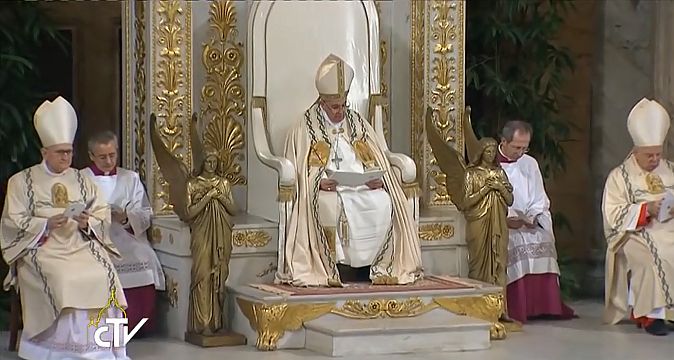
In a new interview ranging from fame to finances to his childhood dreams, Pope Francis explained that despite his strong concern for the poor, he will not sell the “riches of the Church.”
Asked whether he has ever felt pressure to sell “the treasures of the
Church,” the Pope responded, “This is an easy question. They are not the
treasures of the Church, (but) the treasures of humanity.”
“For example, if tomorrow I say that Michelangelo's Pieta is going to be
auctioned, it can't be done, because it's not the property of the
Church. It's inside a Church, but it belongs to humanity,” he said,
explaining that this is true “for all the treasures of the Church.”
The Pope’s comments came in an interview with a Dutch newspaper
“Straatnieuws.” The paper’s most unique quality: it is published by the
homeless of the Dutch city Utrecht.
The interview was conducted Oct. 27 at the Pope’s Vatican residence and published Nov. 6.
Questions were conducted by a homeless street newspaper vendor named
Marc. Vatican journalist Stijn Fens and the former spokesman of the
Dutch Bishops’ Conference, Jan-Willem Wits were also present for the
interview, as well as the paper’s editor, Frank Dries.
Among the topics discussed by the Pope were the dangers of corruption,
his childhood dream profession, the Vatican’s finances, and his personal
commitment to fight poverty.
In his answers to some of the tough questions, Francis did not hesitate
to wade into sensitive topics. One of them was whether or not he is
worried that his frequent pleas for solidarity in defense of the poor
are being politically exploited, as well as how the Church can talk
about the issue in an influential way while staying outside the
political spectrum.
The Pope underlined two temptations in this area, the first being hypocrisy.
“If a believer speaks about poverty or the homeless and leads the life
of a pharaoh – this cannot be done,” he said. “The Church must speak the
truth and also with witness: the witness of poverty.”
He also pointed to the dangers surrounding government agreements. While
agreements with secular governments can be made, “they must be clear
agreements, transparent agreements.”
As an example, Francis pointed to the Vatican’s management of the
Apostolic Palace. The Vatican is in charge of handling the finances, but
“the accounts are all controlled, to avoid corruption, (because) there
is always the temptation of corruption in public life – both political
and religious.”
Discussing the perception that the Vatican is rich, the Holy Father
acknowledged that if one makes a catalogue of all the goods of the
Church, it might seem like “the Church is very rich.”
However, many of the Church’s “riches” are actually treasures that belong to humanity, he explained.
He added that while these items are for the enjoyment of all, there are
some things that he does sell, such as many of the elaborate gifts he
has received. Among them are motorcycles and cars that have either been
given away or sold through an auction.
Proceeds of the sales then go to the Papal Almoner, Archbishop Konrad Krajewski, and are used for the needs of the poor.
And while the Church does have a lot in real estate, he continued, the
money is used “to maintain the structures of the Church and to maintain
the many works the Church does in needy countries: hospitals, schools.”
As an example, the Pope explained that just the day before, he had asked
that 50,000 euros be sent to the Democratic Republic of the Congo to
build three schools, because “education is important for children.”
He also pointed to the 1929 Lateran Concordat that recognized the
sovereignty of the Holy See. When the Italian government at the time
offered the Church a large park in Rome, Pope Pius XI “said no.”
Instead, Pius XI told them, “I want only half of a square kilometer to
guarantee the independence of the Church,” Francis observed, explaining
that “this principle still stands.”
Catholic News Agency
No comments:
Post a Comment